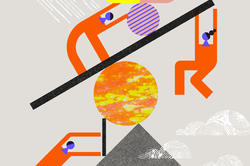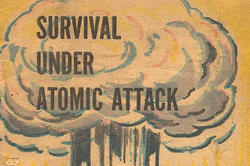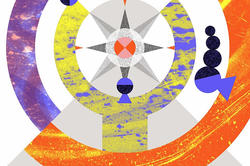RISD’s Center for Complexity designs a suite of solutions intended to advance health equity and reduce adverse medical outcomes for patients of color.
Redesigning Society After COVID

In June RISD’s Center for Complexity (CfC) hosted Carry Forward, its third annual symposium and the second one to be designed and conducted virtually. Scholars, artists and practitioners in various disciplines met online to consider their work and life experiences during the pandemic and look ahead to a more equitable post-pandemic future. Here the CfC team—Justin W. Cook, Julie Woods, Sahib Singh, Toban Shadlyn and Tim Maly—reflects on the event and discusses a few key takeaways.
This year’s virtual symposium invited an exploration of where we want to go as the world emerges from the global pandemic. Where is humanity now? Where are we as a civilization—and a species—and where do we go next, more than a year into the pandemic?
What will we choose to carry forward? Who and what will be left behind?
The redesign of a society that works for everyone looms large and is as yet unfinished. What will we choose to carry forward? What are the tangible and intangible things we will carry forward without our knowledge or consent? Each of us can only carry so much. Who and what will be left behind?

Despite our collective Zoom exhaustion and the constraints of holding a symposium under remote conditions, we were able to attract brilliant contributors across many disciplines, including art and design, medicine, opioids care and addiction, health equity and civic design. The innovations in how we designed the symposium, which allowed new ways of presenting information and engaging dialogue, may be as valuable as the content we presented.
The conversations around embracing uncertainty; what to keep, drop, or modify in medical practice; and the challenges around civic design were all unmoderated. This is a new approach in facilitation. How can we build the simplest scaffolding, even in as short a time as 90 minutes, so that moderators or facilitators are not even inadvertently controlling or shaping the exploration?

One of the best-attended sessions of the symposium was offered in collaboration with the RISD Museum. Ceramics in the World and the World in Ceramics was inspired by the museum’s plans for the January 2022 exhibition Trading Earth. The discussion aimed to inspire a deep consideration of how ceramic objects can provide insight into the practices, mindsets and values that we should carry forward—or leave behind.

RISD faculty members working in a wide range of disciplines, including Alero Akporiaye, Jean Blackburn 79 PT, Anina Major MFA 17 CR, Christopher Roberts and Clement Valla MFA 09 DM, engaged in critical dialogue considering the human creative expression carried by ceramics, their aesthetic characteristics and their “significance as bearers and symbols of history, culture, commerce and meaning.” Freed from any requirement to be experts on ceramics, their extemporaneous conversation modeled a unique convergence of critical and creative thinking to advance inquiry and practice.
Freed from any requirement to be experts on ceramics, participants’ extemporaneous conversation modeled a unique convergence of critical and creative thinking to advance inquiry and practice.
David & Peggy Rockefeller Curator of Decorative Arts Elizabeth Williams, who is curating the Trading Earth exhibition, described the dialogue as a “very welcome opportunity to bring in thoughts and perspectives from RISD faculty members.” And the museum’s Assistant Director of Public and Academic Programs Deborah Clemons explains that event organizers sketched a programmatic framework that supported open exchange and candid observations. Through an attentive and flexible process, key questions were considered and deepened through the lenses of multiple perspectives and a variety of fields of study.
The process by which the symposium as a whole was planned and executed provided a level of intellectual freedom and exploration that is not always present in traditional symposiums. “The lightly managed, unscripted and extemporaneous nature of the symposium events delivered powerful insights,” says CfC Program Coordinator Julie Woods. “There are practices here that we will strive to carry forward into our future work.”
A video of the entire symposium is available online at carryforward.xyz.
August 24, 2021


